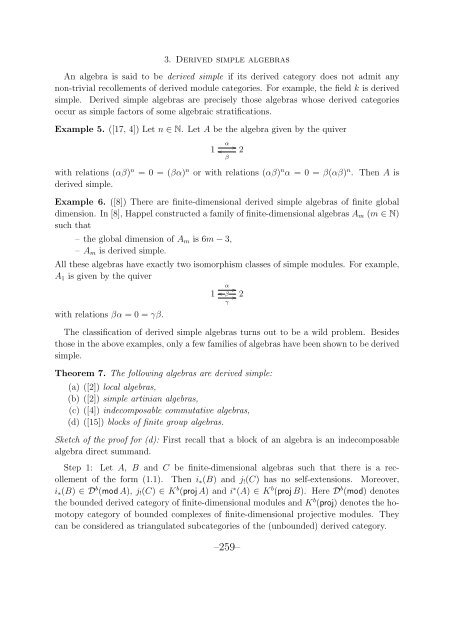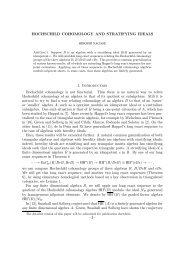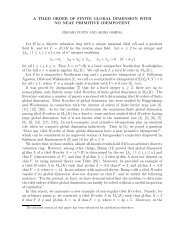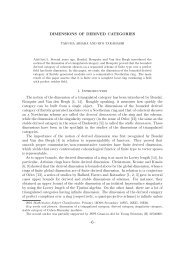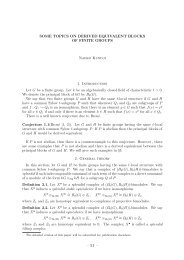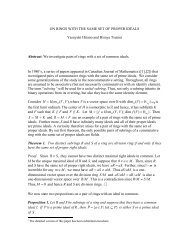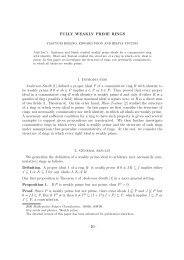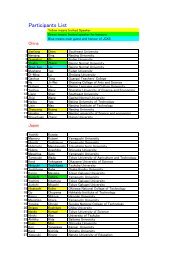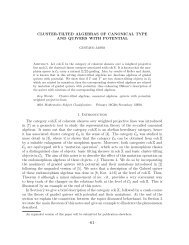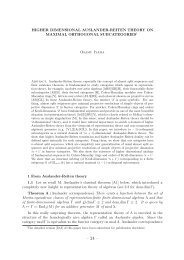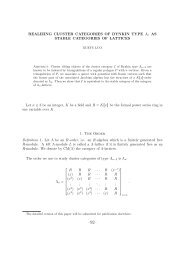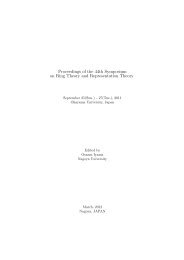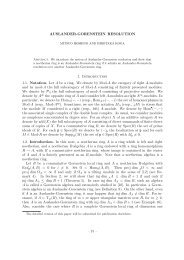Proceedings of the 44th Symposium on Ring Theory and ...
Proceedings of the 44th Symposium on Ring Theory and ...
Proceedings of the 44th Symposium on Ring Theory and ...
Create successful ePaper yourself
Turn your PDF publications into a flip-book with our unique Google optimized e-Paper software.
3. Derived simple algebras<br />
An algebra is said to be derived simple if its derived category does not admit any<br />
n<strong>on</strong>-trivial recollements <str<strong>on</strong>g>of</str<strong>on</strong>g> derived module categories. For example, <str<strong>on</strong>g>the</str<strong>on</strong>g> field k is derived<br />
simple. Derived simple algebras are precisely those algebras whose derived categories<br />
occur as simple factors <str<strong>on</strong>g>of</str<strong>on</strong>g> some algebraic stratificati<strong>on</strong>s.<br />
Example 5. ([17, 4]) Let n ∈ N. Let A be <str<strong>on</strong>g>the</str<strong>on</strong>g> algebra given by <str<strong>on</strong>g>the</str<strong>on</strong>g> quiver<br />
1<br />
α<br />
β<br />
2<br />
with relati<strong>on</strong>s (αβ) n = 0 = (βα) n or with relati<strong>on</strong>s (αβ) n α = 0 = β(αβ) n . Then A is<br />
derived simple.<br />
Example 6. ([8]) There are finite-dimensi<strong>on</strong>al derived simple algebras <str<strong>on</strong>g>of</str<strong>on</strong>g> finite global<br />
dimensi<strong>on</strong>. In [8], Happel c<strong>on</strong>structed a family <str<strong>on</strong>g>of</str<strong>on</strong>g> finite-dimensi<strong>on</strong>al algebras A m (m ∈ N)<br />
such that<br />
– <str<strong>on</strong>g>the</str<strong>on</strong>g> global dimensi<strong>on</strong> <str<strong>on</strong>g>of</str<strong>on</strong>g> A m is 6m − 3,<br />
– A m is derived simple.<br />
All <str<strong>on</strong>g>the</str<strong>on</strong>g>se algebras have exactly two isomorphism classes <str<strong>on</strong>g>of</str<strong>on</strong>g> simple modules. For example,<br />
A 1 is given by <str<strong>on</strong>g>the</str<strong>on</strong>g> quiver<br />
with relati<strong>on</strong>s βα = 0 = γβ.<br />
1<br />
α<br />
β<br />
γ<br />
The classificati<strong>on</strong> <str<strong>on</strong>g>of</str<strong>on</strong>g> derived simple algebras turns out to be a wild problem. Besides<br />
those in <str<strong>on</strong>g>the</str<strong>on</strong>g> above examples, <strong>on</strong>ly a few families <str<strong>on</strong>g>of</str<strong>on</strong>g> algebras have been shown to be derived<br />
simple.<br />
Theorem 7. The following algebras are derived simple:<br />
(a) ([2]) local algebras,<br />
(b) ([2]) simple artinian algebras,<br />
(c) ([4]) indecomposable commutative algebras,<br />
(d) ([15]) blocks <str<strong>on</strong>g>of</str<strong>on</strong>g> finite group algebras.<br />
Sketch <str<strong>on</strong>g>of</str<strong>on</strong>g> <str<strong>on</strong>g>the</str<strong>on</strong>g> pro<str<strong>on</strong>g>of</str<strong>on</strong>g> for (d): First recall that a block <str<strong>on</strong>g>of</str<strong>on</strong>g> an algebra is an indecomposable<br />
algebra direct summ<strong>and</strong>.<br />
Step 1: Let A, B <strong>and</strong> C be finite-dimensi<strong>on</strong>al algebras such that <str<strong>on</strong>g>the</str<strong>on</strong>g>re is a recollement<br />
<str<strong>on</strong>g>of</str<strong>on</strong>g> <str<strong>on</strong>g>the</str<strong>on</strong>g> form (1.1). Then i ∗ (B) <strong>and</strong> j ! (C) has no self-extensi<strong>on</strong>s. Moreover,<br />
i ∗ (B) ∈ D b (mod A), j ! (C) ∈ K b (proj A) <strong>and</strong> i ∗ (A) ∈ K b (proj B). Here D b (mod) denotes<br />
<str<strong>on</strong>g>the</str<strong>on</strong>g> bounded derived category <str<strong>on</strong>g>of</str<strong>on</strong>g> finite-dimensi<strong>on</strong>al modules <strong>and</strong> K b (proj) denotes <str<strong>on</strong>g>the</str<strong>on</strong>g> homotopy<br />
category <str<strong>on</strong>g>of</str<strong>on</strong>g> bounded complexes <str<strong>on</strong>g>of</str<strong>on</strong>g> finite-dimensi<strong>on</strong>al projective modules. They<br />
can be c<strong>on</strong>sidered as triangulated subcategories <str<strong>on</strong>g>of</str<strong>on</strong>g> <str<strong>on</strong>g>the</str<strong>on</strong>g> (unbounded) derived category.<br />
2<br />
–259–


